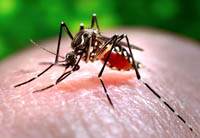 |
| An Ae. aegypti mosquito, one of the primary vectors for the transmission of dengue fever around the world, gets a blood meal from a host. Credit: Photo by James Gathany, courtesy of U.S. Centers for Disease Control |
Use of dengue vaccine may cause short-term spikes in its prevalence
CORVALLIS, Ore. - As researchers continue to work toward vaccines for serious tropical diseases such as dengue fever, experts caution in a new report that such vaccines will probably cause temporary but significant spikes in the disease in the years after they are first used. This counter-intuitive and unwanted result could lead to frustrated policy makers, a skeptical public and concerns that the vaccine is making things worse instead of better, researchers say. In fact, it will just be the natural result of complex interactions between less-than-perfect vaccine protection and routine fluctuations in the populations of insects who carry the diseases. "Our analysis suggests that if we develop and widely use a vaccine for dengue fever, there may later be spikes in the incidence of the disease that are two to three times higher than its normal level," said Jan Medlock, an assistant professor in the Department of Biomedical Sciences at Oregon State University, and expert on the evolution and epidemiology of infectious disease. "We can explain why this will happen and show how, in the long run, vaccine use will clearly result in fewer cases of disease," Medlock said. "Our concern is to warn people in advance about this issue, so that policy makers and the public don't freak out and lose faith in the vaccination programs." This research, published in Epidemiology and Infection, was done by experts at the OSU College of Veterinary Medicine and Clemson University, both of which supported the studies. Scientists used mathematical modeling to examine the quirks of infectious disease transmission that may lead to this quandary. The work was specific to dengue fever, but may also be relevant to other diseases for which vaccines are being sought, such as malaria, and in which the level of protection is less than total. Dengue fever is a serious illness that affects about 50 million people a year, and for which researchers are hoping to develop effective vaccines in the near future. It's not usually fatal but is extremely common in the tropics and subtropics, and has re-emerged in recent decades as the use of insecticides such as DDT has been stopped. There are several serotypes, or strains of the dengue virus, that are spread by mosquitoes. one infection provides some protection, and two infections usually make a person resistant for the rest of their life. In Thailand, where the disease is prevalent, about 80 percent of children have two infections by the age of 11 and develop resistance. Dengue fever is found in 100 countries around the world and 2.5 billion people are at risk of infection. "The problem, if and when we develop and use a vaccine, is that it will provide some, but not complete protection, and it will interrupt the natural, fairly steady rate of infections among children," Medlock said. In this scenario, the beginning of a vaccination program will slow the numbers of children getting the disease - for a while. But it's expected that a dengue vaccine will not provide total protection against infection. Then, during a period when naturally fluctuating mosquito populations reach an unusually high level, a disproportionate number of children - who are still vulnerable to infection and have never had the disease - will become infected in a short period. This could cause loss of faith in the vaccination program among the public or policy makers who have never seen such high levels of the disease, stretch the capabilities of health care facilities and workers to care for the sick, and in a worst-case scenario lead people to avoid the vaccine, researchers said. Some short-term spikes could even be as high as seven times the average rate, they said. "In fact, we conclude in this analysis that over a 15-year period, a vaccination program will clearly reduce the number of overall infections," Medlock said. "These significant spikes will mostly occur as the program is beginning. What we need to do is help people understand these forces so they anticipate them." A possible way to deal with this phenomenon, researchers said, is literally to vaccinate fewer people. This would cause higher numbers of people to get the disease in the long run but reduce the intensity of the spikes and the associated demands on a health care system. The levels of disease will fluctuate based on such variables as location, climate, the efficacy of a vaccine, the numbers of people vaccinated, surges in insect populations, and other factors. This phenomenon may have occurred, or may occur in the future, with almost any vaccine that provides partial, but not total protection against infection.
|

